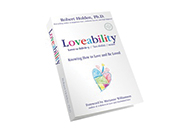The Real Meaning of "I Love You"
Robert Holden, PhD, author of the book Loveability: Knowing How to Love and Be Loved, explains what we're actually saying with those three little words.

Photo: Courtesy of Robert Holden
What do you mean when you say "I love you?" Are you sure? You may be 100 percent sincere when you say "I love you," but what are you trying to say? Get a pen and paper, and complete the following sentence 10 times: "When I say 'I love you,' I mean..." Do this now before reading on.
How did you get on? A lot of my students report some difficulty doing this exercise. During one Loveability course, a three-day program I teach which explores the psychology of love and loving relationships, a lawyer named Daniel told the group, "I must have said 'I love you' to my wife at least 10,000 times, but this is the first time I’ve consciously thought about what it means." Students often report that saying "I love you" can mean something different each time they say it.
The meaning of "I love you" has been tainted for some. For example, Claire, a nurse who attended my first Loveability program, told the group, "I find it difficult to know what 'I love you' means because I was raised in a family in which I never heard those words spoken." Other students have told me that although their parents said "I love you," they didn’t feel loved by them. The meaning of "I love you" was distorted by parental behavior that was manipulative, possessive, critical or controlling.
These three magic words—"I love you"—can cause a lot of confusion and pain in romance, too. "My first serious boyfriend left me after I told him, 'I love you,'" said Paula.
"My last boyfriend said 'I love you' only when he wanted sex," said Julie.
"When my girlfriend says 'I love you,' I feel a pressure to say it back to her," said Kevin.
"Each time my ex-husband was physically violent to me, he'd apologize and say 'I love you' in the sweetest way," said Carole.
"The only girl I've ever said 'I love you' to betrayed me with my best friend," said James.
So let's return to the I Love You Inquiry. When you look at your list of 10 responses, what stands out? How clear were you? What was the most honest thing you said? When my students complete this inquiry for the first time, they often discover that "I love you" is full of agendas. For example, "I love you" means "I need you" or "I want you" or "I own you" or "Agree with me" or "Now say you love me." No wonder these three little words can cause so much trouble.
In a moment, I'd like you to do the exercise again, filling in the blank in the following sentence five times: "When I say 'I love you,' what I really mean is..." Getting clear on what you really mean will help you to be a truly loving presence in your relationships. The people you love will feel even more loved by you because your intention to love is conscious and clear. This is so important, because the real meaning of "I love you" is not found in the words themselves, but in the intention behind them.
Next: A few ideas that can transform your relationship
How did you get on? A lot of my students report some difficulty doing this exercise. During one Loveability course, a three-day program I teach which explores the psychology of love and loving relationships, a lawyer named Daniel told the group, "I must have said 'I love you' to my wife at least 10,000 times, but this is the first time I’ve consciously thought about what it means." Students often report that saying "I love you" can mean something different each time they say it.
The meaning of "I love you" has been tainted for some. For example, Claire, a nurse who attended my first Loveability program, told the group, "I find it difficult to know what 'I love you' means because I was raised in a family in which I never heard those words spoken." Other students have told me that although their parents said "I love you," they didn’t feel loved by them. The meaning of "I love you" was distorted by parental behavior that was manipulative, possessive, critical or controlling.
These three magic words—"I love you"—can cause a lot of confusion and pain in romance, too. "My first serious boyfriend left me after I told him, 'I love you,'" said Paula.
"My last boyfriend said 'I love you' only when he wanted sex," said Julie.
"When my girlfriend says 'I love you,' I feel a pressure to say it back to her," said Kevin.
"Each time my ex-husband was physically violent to me, he'd apologize and say 'I love you' in the sweetest way," said Carole.
"The only girl I've ever said 'I love you' to betrayed me with my best friend," said James.
So let's return to the I Love You Inquiry. When you look at your list of 10 responses, what stands out? How clear were you? What was the most honest thing you said? When my students complete this inquiry for the first time, they often discover that "I love you" is full of agendas. For example, "I love you" means "I need you" or "I want you" or "I own you" or "Agree with me" or "Now say you love me." No wonder these three little words can cause so much trouble.
In a moment, I'd like you to do the exercise again, filling in the blank in the following sentence five times: "When I say 'I love you,' what I really mean is..." Getting clear on what you really mean will help you to be a truly loving presence in your relationships. The people you love will feel even more loved by you because your intention to love is conscious and clear. This is so important, because the real meaning of "I love you" is not found in the words themselves, but in the intention behind them.
Next: A few ideas that can transform your relationship
Before you start again, here are a few ideas that may help you along the way:
An I Love You Inquiry really can transform our relationship to love and to each other. One final thought: Every time you feel moved to say "I love you," it is because you recognize that "love is here." When you tell your friend, your lover or your child, "I love you," you are acknowledging that we are always held in love—even when we can't see it. In every relationship, there will be challenges and conflicts and occasions when we cannot feel the love. In these moments, one heartfelt "I love you" can restore us to love's awareness, which sees that if I am present and you are present, then love must be present, too.

Robert Holden, PhD, is the author of Loveability: Knowing How to Love and Be Loved. He hosts a weekly show on Hay House Radio called Shift Happens! and also contributes daily to his Facebook page.
More from Robert Holden
"I see you"
When people say "I love you" and it is meant truly, they are not relating to you as just a body; they see the real you. Love sees not just with the eyes, but with the heart, too, and it sees your soul. Love sees your eternal loveliness. Love sees the person you are trying to be. Love sees how loveable you really are. That’s why hearing the words "I love you" can give you the courage to be seen. Hence, love helps us to bring each other more fully into existence."I accept you"
In love, we see each other because we do not judge each other. "I love you" can mean "I see you" and also "I accept you." To accept another person is a fully sacred act and never a half-hearted love. It means, "I offer you love, and nothing that is not love." Seen in this light, "I love you" is a vow of acceptance between two friends who are declaring to each other, "I will not judge you" and "I will not label you" and "I will not condemn you." Each time you say "I love you," you are renewing this vow of acceptance and making a commitment to being the presence of love in someone’s life."I thank you"
Love is a grateful heart. When you say "I love you" to someone, you are saying, "I am grateful for you" and "I am grateful to you." This gratitude is recognition for all this person gives to you by his or her presence in your life. You are saying, "Thank you for loving me" and "Thank you for seeing me" and "Thank you for accepting me" and, as the old lyric goes, "Thank you for letting me be myself." Gratitude recognizes that none of us can discover who we really are by ourselves. It is by our undivided relatedness with each other that we experience our loveability."I am here for you"
Each time you say "I love you," you are really saying "I am here for you." "Being here" means being fully present in the relationship—physically, emotionally and spiritually. Saying "I love you" means "I am committed to you" and "I am committed to us." You are telling that person you are in this relationship. You are not waiting for the relationship to sparkle or to improve before you commit to it. You are not playing it safe. You are not wearing a mask. You are not just trying to get something. You are really here, and this relationship really matters to you.An I Love You Inquiry really can transform our relationship to love and to each other. One final thought: Every time you feel moved to say "I love you," it is because you recognize that "love is here." When you tell your friend, your lover or your child, "I love you," you are acknowledging that we are always held in love—even when we can't see it. In every relationship, there will be challenges and conflicts and occasions when we cannot feel the love. In these moments, one heartfelt "I love you" can restore us to love's awareness, which sees that if I am present and you are present, then love must be present, too.

Robert Holden, PhD, is the author of Loveability: Knowing How to Love and Be Loved. He hosts a weekly show on Hay House Radio called Shift Happens! and also contributes daily to his Facebook page.
More from Robert Holden



